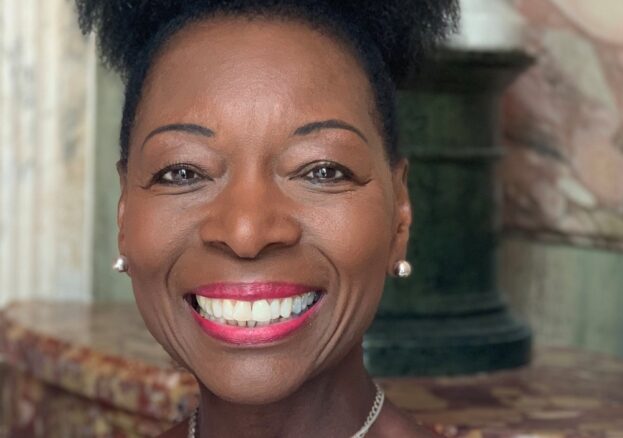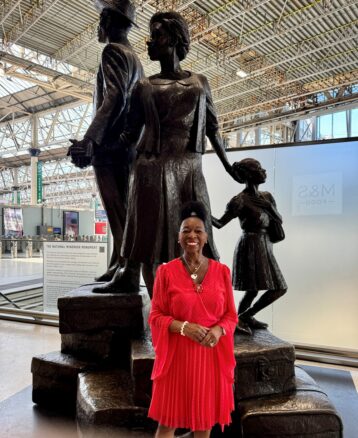
Baroness Floella Benjamin is an inspirational, affectionate, and kind woman who has remained true to herself as she achieved success. Her strength in pride and power are just two attributes that illustrate her prominence. During our brief time together, Floella Benjamin greeted every individual we encountered with a big smile and a conversation. To me, this illustrated something which I deeply believe in when it comes to life – unity.
Winner’s smile
Benjamin’s definitions of the theme are embodied through her philosophical endeavour: a winner’s smile. Growing up in Trinidad, Benjamin was taught that it was part of Britain’s empire, thus she could not comprehend the injustices that she faced:
“Every day was me trying to overpower the world with my fist.”
Her smile became the armour which has served her to this day. When told to stay in her place, or when her achievements were disregarded, Benjamin’s increasing desire for inclusion, saw her flash her winner’s smile. The most significant element of this tactic was:
“It is not a false smile; it is a smile deep down from the heart.”
Witnessing this smile in person, I felt the sincerity and warmth of a tenacious woman fighting prejudices by being authentic.
 Familial love
Familial love
Benjamin’s pride in her cultural identity embodies her strength and her refusal to compromise her beauty:
“I am a Caribbean woman. My father is from Antigua, and my mother’s mother is from Grenada.”
Benjamin was born in Trinidad and lived much of her youth there:
“I love Trinidad, it is like a big rich tapestry.”
Geography was just one element contributing to Benjamin’s success. She stressed the additional significance of her family, particularly her strong mother:
“My mother stood tall. She was the most incredible woman of force and energy, despite a terrible childhood, she forgave those responsible because they taught her how to aspire for better. She wanted to live in Beckenham, Kent (predominately white and middle class), because the residents had the best of everything. And when we went to buy the house, the neighbour called the police on us! But we bought that house and Mum lived there until her death. Now I have claimed Beckenham for my parents. …if my mother hadn’t stood tall, Lord only knows what would have happened.”
Benjamin’s mother motivated her aspirations and empowered her to disseminate that maternal love forward. Furthermore, her family were entrenched in politics, which spurred her desire for justice.
“My grandfather was the deputy prime minister of Antigua, my father was a union man and so I have politics in my DNA, always having this feeling of doing the right thing.”
This is the legacy of the Baroness who received her damehood for charitable work with the Sickle Cell Society and her BAFTA fellowship for her work with children.
Embracing your identity to fulfil your power
The 1970’s saw Benjamin audition as a model for an advert in an African magazine but they admonished her advising: “We can’t have you look like a tribal woman, put a wig on.”
Continually Benjamin was told to ‘stay in her place’ or to conform. However:
“I have never taken parts that I don’t believe will make Black people proud.”
Ironically, it was her interview at Play School which emboldened her to show off her blue beaded plaited hair with pride. Consequently, Benjamin was empowered to push for change:
“In Play School there weren’t any black stories or illustrations, so I went to the producer with my smile, and said can’t we have different races included too? And do you know what she said? ‘we hadn’t noticed’.”
Upon this realisation, Benjamin became more vocal, which led to her writing diverse stories.
Despite Baroness Benjamin achieving significantly for the Black community, she still faces stereotypical labelling. Benjamin firmly counters this by asserting:
“I am never ashamed of my Blackness.”
This assertion is illustrated in her words to her children:
“.. you’re Black and you’re white mixed together which makes you golden.”
Affirmations such as this positively impact upon youth to develop cultural pride and thus feel empowered and confident. We live in a culturally diverse society, so why judge those for embracing that when we fight so hard for diversity and inclusion?
What is next?
Baroness Floella Benjamin is a culturally industrious woman, who continuously strives for progress:
“I am forever passing on the baton […] the earlier you teach children about diversity and inclusion the better.”
Currently, almost all schoolchildren in the UK are studying the pictorial version of her book ‘Coming to England’. Those children, send her messages as follows:
“Dear Floella, we are naming our class after you, and when we grow up, we want to be like you.”
Commencing this interview, I was amazed that this powerful woman had so much faith in children, which is something that I rarely encountered outside of my home growing up. However, learning about Benjamin’s life and the impact of her work, I left the House of Lords extremely optimistic for the future. So, I would like to end this article with Baroness Benjamin’s own words of wisdom:
“Whenever you get a rejection, smile because every disappointment is an appointment with something better.”
